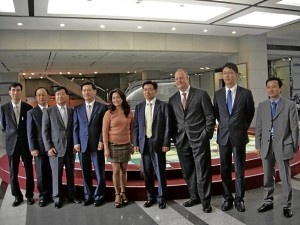Why Hyundai loves the Philippines

HYUNDAI Motor Co. senior executives welcome Hyundai Asia Resources Inc. president Ma. Fe Perez-Agudo (fifth from left) and Philippine media visitors at the Hyundai Motor Group headquarters in Seoul, Korea: (from left) director Songbaik Cho, head of overseas product group; director Chulhwan Kim, head of overseas marketing group; vice president Youngkey Koo, head of Asia-Pacific, Africa & Middle East Group; EVP William Y. W. Lee, head of overseas sales division; SVP Seung Tack Kim, head of global services division; director Frank Ahrens, head of Global PR; general manager Brian Sir, team leader of Global PR Team; and general manager Wonsang Cho, team leader of brand communication team.
SEOUL—It’s nice to know that our country is loved by people other than ourselves. At a press conference with 17 selected Philippine print media executives and journalists at the Hyundai Motor Co. headquarters in Seoul last Friday, senior executives led by executive vice president and COO/Global Business Division Seung-Tack Kim, senior vice president/Overseas Sales Division William Y. W. Lee and vice president/Asia-Pacific, Africa & Middle East Group Y. K. Koo declared their company’s love for the Philippines.
The Philippines holds a special place in Hyundai’s heart because it is the largest market in the Southeast Asian region. At a welcome dinner, Y. K. Koo repeated the automaker’s declaration of love for the Philippines and revealed that 17,000 Hyundai vehicles were sold in 2011 in the Philippines, where the market is growing by 9 percent and Hyundai Asia Resources Inc. (HARI), Hyundai Philippines’ distributor, is aiming to sell 19,000 to 20,000 units this year.
Surprisingly enough, Hyundai sold only 70,000 units in the entire Asean region last year, a drop in the bucket of its 4,059,000 total global sales that includes 739,800 vehicles sold in China. In terms of sales volume, Hyundai, together with Kia Motors, where it has a 34 percent stake, is ranked the fifth-biggest automaker in the world. Hyundai makes more cars outside Korea than in Korea since it has six overseas plants (United States, China, India, Turkey, Czechoslovakia, Russia) with a third factory in China opening this month to bring Hyundai’s Chinese production capacity to one million vehicles per year. Hyundai has two plants in India. A newly built factory in Brazil will start production this September to expand Hyundai’s market share in the Central and South American region.
Regionalize. Hyundai is expanding its BRIC (Brazil, Russia, India, China) operations in pursuit of its strategy to regionalize cars instead of producing a world car, said Frank Ahrens, director of the company’s global PR team. Regionalizing cars means adapting a car’s specs to suit a region’s climate, road conditions and the fast-changing needs and preferences of consumers. For example, in Russia the ground clearance of the Accent is higher, the headlights and windshield are bigger to cope with the extreme weather conditions and rough roads. To develop designs and localized models that best satisfy regional markets, the Hyundai Motor Group operates 11 R&D centers in the United States, Germany, Japan, India and China.
Ahrens claimed that Hyundai has planned carefully to have the best strategic distribution of sales around the world so that if the economy and sales slump in one region, other regions with fast-growing markets would counterbalance the downtrend. He also pointed out that Hyundai Motor is the world’s only global automaker with its own steel plant. Hyundai Steel, the world’s second-biggest steel plant, supplies 46 percent of the sheet metal and other steel components of Hyundai vehicles, striving to produce the strongest, lightest steel to improve the car’s fuel efficiency and safety level.
Article continues after this advertisementHyundai has progressed by leaps and bounds since it rolled out its first car, the Pony, in 1967. Its product line-up is now available in 200 countries through some 6,000 dealers and 32 overseas sales and production subsidiaries with 200,000 employees worldwide. Hyundai began acing the Initial Quality Study of J.D. Power in 2004 and the Vehicle Dependability Study in 2009. Hyundai’s Gamma engine was named one of Ward’s Auto 10 Best Engines in 2012, following the Tau engine winning the same award from 209 to 2011. In 2010, the Genesis sedan won the North American Car of the Year Award and in 2011, the Elantra won the Car of the Year Award in the United States, Canada, South Africa and the Philippines.
Article continues after this advertisementPlans. However, Hyundai has no plans at present to build a factory and assemble CKD cars in Southeast Asia despite the region’s fast-growing market. Korea’s proximity to the region and Hyundai’s small market share due to the entrenched predominance of Japanese brands may explain why.
Nonetheless, Hyundai is pushing ahead aggressively in other areas. From benchmarking Japanese brands in 1967, Hyundai is now benchmarking the European brands in an effort to evolve from a Value Brand to a Valuable Brand. Aside from extensive R&D of hydrogen fuel cell vehicles, biofuel, electric and hybrid vehicles under its Blue Drive program, Hyundai seeks to captivate the hearts of people all over the world through its strategy of localization and differentiation. The development of fluidic sculpture as Hyundai’s new design language and the car maker’s continued support of the World Cup evoke emotion and passion for the brand in the sense that the car is the emotional third life space after the home and the office. And that the car occupies a central role in people’s lives.
Bottom line, Hyundai is seeking to be No. 1 globally—but in quality and in people’s hearts, not in sales volume.